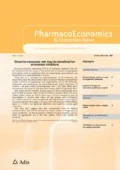Individuals enrolled in consumer-directed health plans (CDHPs) experiencing a COVID-19-like respiratory hospitalisation have significantly higher out-of-pocket (OOP) spending than individuals enrolled in traditional plans in the US.
This is the main finding of a study that examined OOP spending associated with respiratory hospitalisations for conditions similar to those caused by coronavirus disease 2019 (COVID-19) for commercially insured individuals aged < 65 years using administrative claims data for the period from January 2016 to August 2019. OOP spending for CDHP enrollees was compared with that for individuals enrolled in traditional, low-deductible plans.
The analysis of data from 34 395 individuals showed that average OOP spending for respiratory hospitalisations was significantly higher among CDHP enrollees than among enrollees in traditional plans ($US1961 vs $1653; 2019 values). This difference was largest for those aged 0−21 years ($2237 vs $1685), decreasing with increasing age. The analysis also showed that the largest difference in OOP spending occurred for those hospitalised during the first quarter of the year ($2578 vs $1978). "Financial strain associated with respiratory-related hospitalizations due to COVID-19 may fall disproportionately on CDHP enrollees," conclude the researchers. They suggest that "self-insured employers that have not waived cost-sharing payments for hospitalizations related to COVID-19 should consider doing so; for those that do not, federal policymakers should consider waiving cost sharing for those in self-insured plans, as some in Congress are currently debating."
Reference
Eisenberg MD, et al. Financial Risk for COVID-19-like Respiratory Hospitalizations in Consumer-Directed Health Plans. American Journal of Preventive Medicine : 15 Jun 2020. Available from: URL: https://doi.org/10.1016/j.amepre.2020.05.008
Rights and permissions
About this article
Cite this article
OOP burden for COVID-19-like respiratory hospitalisations varies in US. PharmacoEcon Outcomes News 856, 21 (2020). https://doi.org/10.1007/s40274-020-6921-3
Published:
Issue Date:
DOI: https://doi.org/10.1007/s40274-020-6921-3

